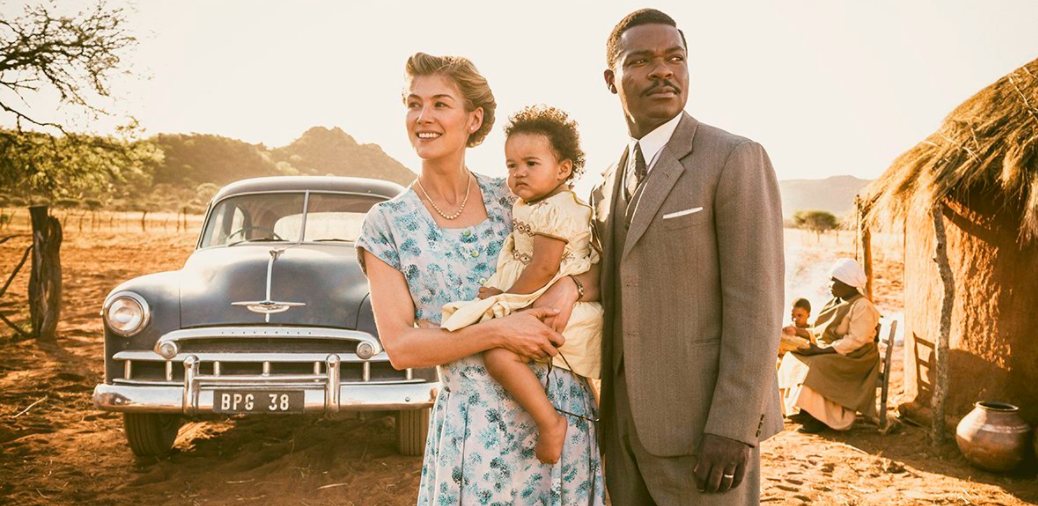Biographical films are tough as they tell the story of usually unknown real-life heroes that rose to the occasion and defied the system. Therefore, on one hand, filmmakers feel pressured to honestly present the ‘based-on-a-true-story’ lives that they portray, while, on the other, they must also entertain and please audiences, if only for the sake of financial success. A United Kingdom, Amma Asante’s new directorial effort, succeeds mostly in entertaining the audience, but, unfortunately, it largely falls short of doing justice to the story it presents, leaving the viewer wanting much more.
The film tells the story of Seretse Khama (David Oyelowo), the heir to the throne of the UK’s Bechuanaland Protectorate, and Ruth Williams (Rosamund Pike), the white, British girl who became his wife. Oyelowo and Pike are competent performers that imbue their characters with grace and humanity, becoming the film’s main highlights. Oyelowo plays the strong-minded heir with pathos and fierceness, who, despite the racial tensions, is unwilling to give up either his country or the woman he loves. Pike, on the other hand, plays Ruth with both a down-to-earth sweetness and unwavering determination, portraying a woman who knows what she wants and is not afraid to say so.
If there is anything to fault the characters with, it is the lack of backstory and psychological depth they are given, which makes their interactions, at least initially, feel contrived. The film does not dive into their inner conflicts and reservations regarding their complicated relationship. Thus, Seretse and Ruth do not doubt nor waver, resulting in predictability at the expense of suspense. Neither is going to give up fighting, which is great because in that way the film does not digress into unnecessary drama. Nevertheless, their decisions, such as getting married, remain utterly fixed for the entire film, which would have been a problem if Oyelowo and Pike were not as likable or convincing in their respective roles.
As for supporting characters, most of actors do a fine job, but their characters are there mostly as biopic prototypes. Laura Carmichael’s performance as Ruth’s supportive sister brings some of the film’s biggest laughs, while Nicholas Lyndhurst and Anastasia Hill bring poignancy to their roles as Ruth’s parents, who disown their daughter after she decides to marry a black man. However, this conflict is underdeveloped and largely inconsequential; by the end, per usual, everyone is crying and sharing embraces. The same issue is evident on the side of Seretse’s family. Vusi Kunene and Terry Pheto inject their roles as uncle and sister, respectively, with candor and charisma. Still, the sudden changes in their attitudes, from judgmental and opposing to accepting and caring, once again shed light into the characters’ lack of dimension. Perhaps the most one dimensional characters in the film, though, are the villains, cartoonishly played by Tom Felton and Jack Davenport. Their motivations are largely political, but considering the lack of charm the actors bring to their roles, one cannot help but feel annoyed by their presence.
This perfectly capable cast is sadly diminished by flat direction, awkward writing, and, at times, choppy editing. Asante is more concerned with telling an uplifting story than with the real-life people she wants to present, and this is why the entire film, by the end, feels generic. Many of the scenes the audience ends up getting seem to be taken directly from other, better biopics. Here you have the initial meet-cute at a jazz bar between the two leads. The chemistry is palpable and the dialogue is witty, but isn’t it always? Shortly afterwards begins a sweet, though short montage that develops their relationship, which becomes increasingly complicated due to his blackness and her whiteness. In less than fifteen minutes, they are already married and battling all those who oppose their union. These scenes do not benefit from corny pieces of dialogue that take the viewers out of the story, and make them wonder whether they are watching merely another Nicholas Sparks movie. In the same way, at times the film feels crowded and the changes from scene to scene are not always smooth; though what is being presented is not terribly hard to understand, it sometimes makes for a bewildering viewing experience.
That said, the film is gorgeously shot in a striking combination of dark, bluish tones for the scenes in London, alluding to the cold political and social environment, and of warm, reddish tones for the scenes in Bechuanaland, the heart of Seretse’s and Ruth’s love. The production and costume design are beautifully rendered, though not particularly memorable, as is Patrick Doyle’s rather monotonous score. As the movie progresses, likewise, Assante’s direction becomes more assured, but is never able to truly elevate the material.
To its credit, the film never fails to entertain and engage, presenting interesting and original themes along the way. Race and discrimination are certainly involved, and despite a couple of introductory scenes that bring these topics to the foreground, the movie (quite surprisingly) mostly delves into the political implications of our heroes’ union and the machinations of more powerful people to keep them apart. It is an unusual, but fresh route to take, which, despite suffering in the third act for uneven pacing, succeeds in presenting thought-provoking themes regarding the morality of the entire situation.
Overall, A United Kingdom is not a great film, but one could easily categorize it as a slightly above average biopic. The story it presents is unique, but it is presented in such an unoriginal way that the final product fails to stand out. One cannot help feeling that under a more adept director and a better script, the film would have thrived. There is nothing to hate about the movie itself, however, besides strong performances and interesting themes, there is nothing in particular to remember about it either.







